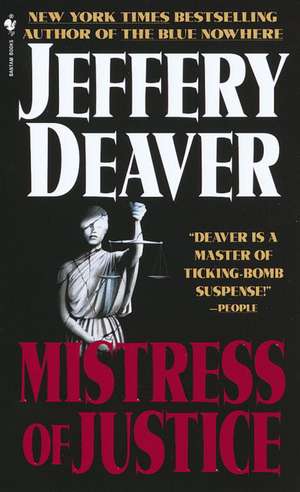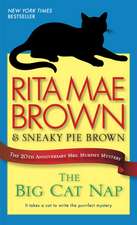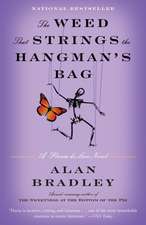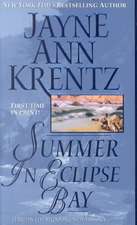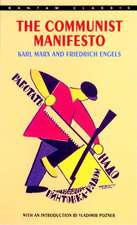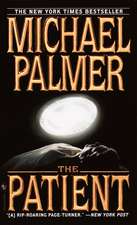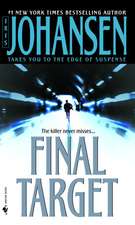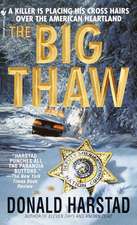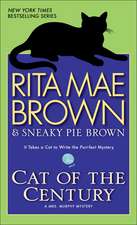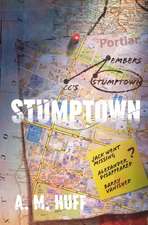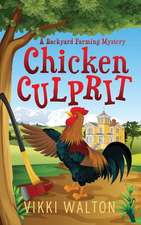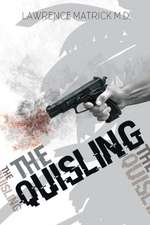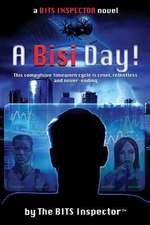Mistress of Justice
Autor Jeffery Deaver, Copyright Paperback Collectionen Limba Engleză Paperback – 31 mar 2002
Eager to get closer to this handsome, brilliant, and very private man, Taylor signs on...only to find that as she delves deeper and deeper into what goes on behind closed doors at Hubbard, White & Willis, she uncovers more than she wants to know--including a plentitude of secrets damaging enough to smash careers and dangerous enough to push someone to commit murder. Yet who is capable of going to that extreme? With her life on the line, Taylor is about to learn the lethal answer....
Preț: 48.66 lei
Nou
Puncte Express: 73
Preț estimativ în valută:
9.31€ • 9.72$ • 7.71£
9.31€ • 9.72$ • 7.71£
Carte disponibilă
Livrare economică 14-28 martie
Preluare comenzi: 021 569.72.76
Specificații
ISBN-13: 9780553584455
ISBN-10: 0553584456
Pagini: 368
Dimensiuni: 107 x 175 x 25 mm
Greutate: 0.18 kg
Editura: Bantam
ISBN-10: 0553584456
Pagini: 368
Dimensiuni: 107 x 175 x 25 mm
Greutate: 0.18 kg
Editura: Bantam
Notă biografică
Jeffery Deaver is an internationally #1 bestselling author. His books are sold in 150 countries and have been translated into twenty-five languages. He has been awarded the Steel Dagger, the Short Story Dagger from the Crime Writers' Association, and the International Thriller Writers Award for Best Thriller of the Year and is a three-time recipient of the Ellery Queen Readers Choice Award for Best Short Story of the Year. He's been nominated for six Edgar Awards from the Mystery Writers of America. He lives in North Carolina.
Extras
CHAPTER ONE
The drapery man had been warned that even though it was now well after midnight, Sunday morning of the Thanksgiving holiday, there would very likely be people in the firm here, attorneys and paralegals, still working.
And so he carried the weapon at his side, pointed downward.
It was a curious thing--not a knife exactly, more of an ice pick, but longer and made of a blackened, tempered metal.
He held it with the confidence of someone who was very familiar with the device. And who had used it before.
Dressed in gray coveralls bearing the stencil of a bogus drapery cleaning service and wearing a baseball cap, the big, sandy-haired man now paused and, hearing footsteps, slipped into an empty office. Then there was silence. And he continued on, through shadows, pausing for a long moment, frozen like a fox near a ground nest of skittish birds.
He consulted the diagram of the firm, turned along one corridor and continued, gripping the handle of the weapon tightly in his hand, which was as muscular as the rest of his body.
As he neared the office he sought, he reached up and pulled a paper face mask over his mouth. This was not so that he wouldn't be recognized but because he was concerned that he might lose a fleck of spit that could be retrieved as evidence and used in a DNA match.
The office, which belonged to Mitchell Reece, was at the end of the corridor, not far from the front door of the firm. Like all the offices here, the lights were left on, which meant that the drapery man wasn't sure that it was unoccupied. But he glanced in quickly, saw that the room was empty and stepped inside.
The office was very cluttered. Books, files, charts, thousands of sheets of papers. Still, the man found the filing cabinet easily--there was only one here with two locks on it--and crouched, pulling on tight latex gloves and extracting his tool kit from his coverall pockets.
The drapery man set the weapon nearby and began to work on the locks.
Scarf, Mitchell Reece thought, drying his hands in the law firm's marble-and-oak rest room. He'd forgotten his wool scarf.
Well, he was surprised he'd managed to remember his coat and briefcase. The lanky thirty-three-year-old associate, having had only four hours' sleep, had arrived at the firm around 8 a.m. yesterday, Saturday, and had worked straight through until about an hour ago, when he'd fallen asleep at his desk.
A few moments before, something had startled him out of that sleep. He'd roused himself and decided to head home for a few hours of shut-eye the old-fashioned way--horizontally. He'd grabbed his coat and briefcase and made this brief pit stop.
But he wasn't going outside without his scarf--1010 WINS had just reported the temperature was 22 degrees and falling.
Reece stepped into the silent corridor.
Thinking about a law firm at night.
The place was shadowy but not dark, silent yet filled with a white noise of memory and power. A law firm wasn't like other places: banks or corporations or museums or concert halls; it seemed to remain alert even when its occupants were gone.
Here, down a wide wallpapered corridor, was a portrait of a man in stern sideburns, a man who left his partnership at the firm to become governor of the state of New York.
Here, in a small foyer decorated with fresh flowers, was an exquisite Fragonard oil painting, no alarm protecting it. In the hall beyond, two Keith Harings and a Chagall.
Here, in a conference room, were reams of papers containing the magic words required by the law to begin a corporate breach of contract suit for three hundred million dollars, and in a similar room down the hall sat roughly the same amount of paper, assembled in solemn blue binders, which would create a charitable trust to fund private AIDS research.
Here, in a locked safe-file room, rested the last will and testament of the world's third-richest man--whose name most people had never heard of.
Mitchell Reece put these philosophical meanderings down to sleep deprivation, told himself to mentally shut up and turned down the corridor that would lead to his office.
Footsteps approaching.
In a soldier's instant the drapery man was on his feet, the ice pick in one hand, his burglar tools in the other. He eased behind the door to Reece's office and quieted his breathing as best he could.
He'd been in this line of work for some years. He'd been hurt in fights and had inflicted a great deal of pain. He'd killed seven men and two women. But this history didn't dull his emotions. His heart now beat hard, his palms sweated and he fervently hoped he didn't have to hurt anyone tonight. Even people like him vastly preferred to avoid killing.
Which didn't mean he'd hesitate to if he were found out here.
The steps grew closer.
Mitchell Reece, walking unsteadily from exhaustion, moved down the corridor, his feet tapping on the marble floor, the sound occasionally muffled when he strode over the Turkish rugs carefully positioned throughout the firm (and carefully mounted on antiskid pads; law firms are extremely cognizant of slip-and-fall lawsuits).
In his mind was a daunting list of tasks to complete before the trial that was scheduled in two days. Reece had graduated from Harvard Law fourth in his class, largely thanks to lists--memorizing for his exams volumes of cases and rules of law and statutes. He was now the firm's most successful senior litigation associate for much the same reason. Every single aspect of the case--the civil trial of New Amsterdam Bank and Trust, Ltd. v. Hanover and Stiver, Inc.--was contained in a complicated series of lists, which Reece was constantly reviewing and editing in his mind.
He supposed he'd been reviewing his lists when he'd neglected to pick up his scarf.
He now approached the doorway and stepped inside.
Ah, yes, there it was, the tan cashmere given to him by a former girlfriend. It sat just where he'd left it, next to the refrigerator in the coffee room across from his office. When he'd arrived that morning--well, make that yesterday morning at this point--he'd stopped first in this canteen room to make a pot of coffee and had dropped the scarf on the table while getting the machine going.
He now wrapped it around his neck and stepped out into the corridor. He continued to the front door of the firm. He hit the electric lock button and--hearing the satisfying click that he'd come to know so well, thanks to his thousands of late hours at the firm--Mitchell Reece stepped into the lobby, where he summoned the elevator.
As he waited it seemed to him that he heard a noise somewhere in the firm--nearby. A faint whine of a door hinge maybe. Followed by the snick-snick of two metal objects faintly colliding.
But then the elevator arrived. Reece stepped in and began once again reciting his scrolls of lists silently to himself.
"I think we may have a misunderstanding," Taylor Lockwood said.
"Not really," returned the voice, also female though much older, from the phone.
Taylor dropped into her squeaky chair and rolled against the wall of her cubicle. Not really? What did that mean? She continued, "I'm the lead paralegal on the SCB closing. That's at four today."
It was 8:30 a.m., the Tuesday after the Thanksgiving holiday, and she'd just arrived back here after a few hours' sleep at home, having spent most of the night at the firm, editing, assembling and stapling hundreds of documents for the closing this afternoon.
Ms. Strickland, on the other end of the line, said, "You've been reassigned. Something urgent."
This'd never happened that Taylor knew about. It was general knowledge--as solid as Newton's laws--that a law firm partner was incapable of handling a business closing without the presence of the paralegal who'd worked on the deal. Law is manifest in the details, and a firm's paralegals are the gurus of minutiae.
The only reason for a last-minute reassignment was if a major screwup had occurred.
But Taylor Lockwood did not screw up and a cursory review of her ball-busting work on the case over the past weeks revealed no glitches the remedy for which would involve her summarily getting kicked off the deal.
"What're my options?" she asked the paralegal supervisor.
"Actually," the word stretching into far more syllables than it had, "there are no options."
Taylor spun her chair one way, then the other. A paper cut inflicted by a UCC security agreement last night had started to bleed again and she wrapped her finger in a napkin with a happy turkey printed on it, a remnant from a firm cocktail party the week before. "Why--?"
"Mitchell Reece needs your help."
Reece? Taylor reflected. So I'll be playing with the big boys. . . . Good news, but still odd. "Why me? I've never worked for him."
"Apparently your reputation has preceded you." Ms. Strickland sounded wary, as if she hadn't known that Taylor had a reputation. "He said you and only you."
"Is this long-term? I'm taking a vacation next week. I'm scheduled to go skiing."
"You can negotiate with Mr. Reece. I mentioned your schedule to him."
"What was his reaction?"
"He didn't seem overly concerned."
"Why would he be? He's not the one going skiing." Blood seeping through the napkin had stained the turkey's smiling face. She pitched it out.
"Be in his office in an hour."
"What sort of project?"
A pause, while Ms. Strickland perhaps selected from among her quiver of delicate words. "He wasn't specific."
"Should I call Mr. Bradshaw?"
"It's all taken care of."
"I'm sorry?" Taylor asked. "What's been taken care of?"
"Everything. You've been transferred and another paralegal--two actually--are working with Mr. Bradshaw."
"Already?"
"Be in Mr. Reece's office in one hour," Ms. Strickland reminded.
"All right."
"Oh, one more thing."
"What's that?"
"Mr. Reece said you're not supposed to mention this to anyone. He said that was very important. Not to anyone."
"Then I won't."
They hung up.
Taylor walked through the carpeted cubicles of the paralegal pen to the one window in this part of the firm. Outside, the Financial District was bathed in early-morning, overcast light. She didn't care much for the scenery today. Too much old grimy stone, like weathered, eerie mountains. In one window of a building across the way, a maintenance man was struggling to erect a Christmas tree. It seemed out of place in the huge marble lobby.
She focused on the window in front of her and realized she was looking at her own reflection.
Taylor Lockwood was not heavy but neither was she fashionably bony or angular. Earthy. That was how she thought of herself. When asked her height she would answer five-five (she was five-four and a quarter) but she had a dense black tangle of hair that added another two inches. A boyfriend once said that with her hair hanging frizzy and loose she looked like she belonged in a pre-Raphaelite painting.
On days when she was in a good mood she believed she resembled a young Mary Pickford. On not-so-good days she felt like a thirty-year-old little girl, standing pigeon-toed, impatiently waiting for the arrival of maturity, decisiveness, authority. She thought she looked her best in imperfect reflections, like storefronts painted black.
Or Wall Street law firm windows.
She turned away and walked back to her cubicle. It was now close to nine and the firm was coming awake, growing busier--catching up with her; this was usually the case; Taylor Lockwood was often one of the first employees to arrive. Other paralegals were making their way to their desks. Shouts of greetings--and warnings of impending crises--were crisscrossing the paralegal pen, war stories of subway snarls and traffic jams were exchanged. She sat down in her chair and thought about how abruptly the course of life can change, and at someone else's whim.
Mr. Reece said you're not supposed to mention this to anyone. He said that was very important. Not to anyone.
Then I won't.
Taylor glanced at her finger and went to find a Band-Aid for the paper cut.
CHAPTER TWO
On a warm morning in April of 1887, a balding, thirty-two-year-old sideburned lawyer named Frederick Phyle Hubbard walked into a small office on lower Broadway, slipped his silk hat and Prince Albert coat onto a hook and said wryly to his partner, "Good morning, Mr. White. Have you secured any clients yet?"
The life of a law firm began.
Both Hubbard and George C. T. White had graduated from Columbia Law School and had promptly come under the acutely probing eye of Walter Carter, Esquire, the senior partner at Carter, Hughes and Cravath. Carter hired them without pay for a year then turned them into professionals at the end of their probation by paying them the going salary of twenty dollars a month.
Six years later, the two men--as ambitious as Carter had pegged them to be--borrowed three thousand dollars from White's father, hired one law clerk and a male secretary and opened their own firm.
Though they dreamed of offices in the state-of-the-art Equitable Building at 120 Broadway they settled for less. Rent in the old building they chose near Trinity Church was sixty-four dollars a month, which bought the partners two dark rooms. Still, their quarters had central heat (though they kept the office's two fireplaces going throughout most of January and February) and an elevator that one operated by pulling a thick rope running through the middle of the car with pieces of tapestry carpeting Hubbard's wife had cut and stitched; the felt pads provided by the building management were, Hubbard felt, inelegant, and he feared they might "impress clients adversely."
Over lunch at Delmonico's on Fifth Avenue, where Hubbard and White sunk much of their first profits feeding existing and would-be clients, they would brag about the firm's new letterpress, which used a damp cloth to make copies of firm correspondence. The firm had a typewriter but the lawyers wrote most of their correspondence in ink with steel pens. Hubbard and White both insisted that their secretary fill the firm's ink-blotting shakers with Lake Champlain black sand. The men had looked at, though rejected, a telephone--it would have cost ten dollars a month (besides, there was no one to call but court clerks and a few government officials).
In school both men had dreamed of becoming great trial lawyers and during their clerking days at Carter, Hughes they'd spent many hours in courtrooms watching famous litigators cajole, charm and terrorize juries and witnesses alike. But in their own practice economics could not be ignored and the lucrative field of corporate law became the mainstay of their young practice. They billed at fifty-two cents an hour though they added arbitrary and generous bonuses for certain assignments.
The drapery man had been warned that even though it was now well after midnight, Sunday morning of the Thanksgiving holiday, there would very likely be people in the firm here, attorneys and paralegals, still working.
And so he carried the weapon at his side, pointed downward.
It was a curious thing--not a knife exactly, more of an ice pick, but longer and made of a blackened, tempered metal.
He held it with the confidence of someone who was very familiar with the device. And who had used it before.
Dressed in gray coveralls bearing the stencil of a bogus drapery cleaning service and wearing a baseball cap, the big, sandy-haired man now paused and, hearing footsteps, slipped into an empty office. Then there was silence. And he continued on, through shadows, pausing for a long moment, frozen like a fox near a ground nest of skittish birds.
He consulted the diagram of the firm, turned along one corridor and continued, gripping the handle of the weapon tightly in his hand, which was as muscular as the rest of his body.
As he neared the office he sought, he reached up and pulled a paper face mask over his mouth. This was not so that he wouldn't be recognized but because he was concerned that he might lose a fleck of spit that could be retrieved as evidence and used in a DNA match.
The office, which belonged to Mitchell Reece, was at the end of the corridor, not far from the front door of the firm. Like all the offices here, the lights were left on, which meant that the drapery man wasn't sure that it was unoccupied. But he glanced in quickly, saw that the room was empty and stepped inside.
The office was very cluttered. Books, files, charts, thousands of sheets of papers. Still, the man found the filing cabinet easily--there was only one here with two locks on it--and crouched, pulling on tight latex gloves and extracting his tool kit from his coverall pockets.
The drapery man set the weapon nearby and began to work on the locks.
Scarf, Mitchell Reece thought, drying his hands in the law firm's marble-and-oak rest room. He'd forgotten his wool scarf.
Well, he was surprised he'd managed to remember his coat and briefcase. The lanky thirty-three-year-old associate, having had only four hours' sleep, had arrived at the firm around 8 a.m. yesterday, Saturday, and had worked straight through until about an hour ago, when he'd fallen asleep at his desk.
A few moments before, something had startled him out of that sleep. He'd roused himself and decided to head home for a few hours of shut-eye the old-fashioned way--horizontally. He'd grabbed his coat and briefcase and made this brief pit stop.
But he wasn't going outside without his scarf--1010 WINS had just reported the temperature was 22 degrees and falling.
Reece stepped into the silent corridor.
Thinking about a law firm at night.
The place was shadowy but not dark, silent yet filled with a white noise of memory and power. A law firm wasn't like other places: banks or corporations or museums or concert halls; it seemed to remain alert even when its occupants were gone.
Here, down a wide wallpapered corridor, was a portrait of a man in stern sideburns, a man who left his partnership at the firm to become governor of the state of New York.
Here, in a small foyer decorated with fresh flowers, was an exquisite Fragonard oil painting, no alarm protecting it. In the hall beyond, two Keith Harings and a Chagall.
Here, in a conference room, were reams of papers containing the magic words required by the law to begin a corporate breach of contract suit for three hundred million dollars, and in a similar room down the hall sat roughly the same amount of paper, assembled in solemn blue binders, which would create a charitable trust to fund private AIDS research.
Here, in a locked safe-file room, rested the last will and testament of the world's third-richest man--whose name most people had never heard of.
Mitchell Reece put these philosophical meanderings down to sleep deprivation, told himself to mentally shut up and turned down the corridor that would lead to his office.
Footsteps approaching.
In a soldier's instant the drapery man was on his feet, the ice pick in one hand, his burglar tools in the other. He eased behind the door to Reece's office and quieted his breathing as best he could.
He'd been in this line of work for some years. He'd been hurt in fights and had inflicted a great deal of pain. He'd killed seven men and two women. But this history didn't dull his emotions. His heart now beat hard, his palms sweated and he fervently hoped he didn't have to hurt anyone tonight. Even people like him vastly preferred to avoid killing.
Which didn't mean he'd hesitate to if he were found out here.
The steps grew closer.
Mitchell Reece, walking unsteadily from exhaustion, moved down the corridor, his feet tapping on the marble floor, the sound occasionally muffled when he strode over the Turkish rugs carefully positioned throughout the firm (and carefully mounted on antiskid pads; law firms are extremely cognizant of slip-and-fall lawsuits).
In his mind was a daunting list of tasks to complete before the trial that was scheduled in two days. Reece had graduated from Harvard Law fourth in his class, largely thanks to lists--memorizing for his exams volumes of cases and rules of law and statutes. He was now the firm's most successful senior litigation associate for much the same reason. Every single aspect of the case--the civil trial of New Amsterdam Bank and Trust, Ltd. v. Hanover and Stiver, Inc.--was contained in a complicated series of lists, which Reece was constantly reviewing and editing in his mind.
He supposed he'd been reviewing his lists when he'd neglected to pick up his scarf.
He now approached the doorway and stepped inside.
Ah, yes, there it was, the tan cashmere given to him by a former girlfriend. It sat just where he'd left it, next to the refrigerator in the coffee room across from his office. When he'd arrived that morning--well, make that yesterday morning at this point--he'd stopped first in this canteen room to make a pot of coffee and had dropped the scarf on the table while getting the machine going.
He now wrapped it around his neck and stepped out into the corridor. He continued to the front door of the firm. He hit the electric lock button and--hearing the satisfying click that he'd come to know so well, thanks to his thousands of late hours at the firm--Mitchell Reece stepped into the lobby, where he summoned the elevator.
As he waited it seemed to him that he heard a noise somewhere in the firm--nearby. A faint whine of a door hinge maybe. Followed by the snick-snick of two metal objects faintly colliding.
But then the elevator arrived. Reece stepped in and began once again reciting his scrolls of lists silently to himself.
"I think we may have a misunderstanding," Taylor Lockwood said.
"Not really," returned the voice, also female though much older, from the phone.
Taylor dropped into her squeaky chair and rolled against the wall of her cubicle. Not really? What did that mean? She continued, "I'm the lead paralegal on the SCB closing. That's at four today."
It was 8:30 a.m., the Tuesday after the Thanksgiving holiday, and she'd just arrived back here after a few hours' sleep at home, having spent most of the night at the firm, editing, assembling and stapling hundreds of documents for the closing this afternoon.
Ms. Strickland, on the other end of the line, said, "You've been reassigned. Something urgent."
This'd never happened that Taylor knew about. It was general knowledge--as solid as Newton's laws--that a law firm partner was incapable of handling a business closing without the presence of the paralegal who'd worked on the deal. Law is manifest in the details, and a firm's paralegals are the gurus of minutiae.
The only reason for a last-minute reassignment was if a major screwup had occurred.
But Taylor Lockwood did not screw up and a cursory review of her ball-busting work on the case over the past weeks revealed no glitches the remedy for which would involve her summarily getting kicked off the deal.
"What're my options?" she asked the paralegal supervisor.
"Actually," the word stretching into far more syllables than it had, "there are no options."
Taylor spun her chair one way, then the other. A paper cut inflicted by a UCC security agreement last night had started to bleed again and she wrapped her finger in a napkin with a happy turkey printed on it, a remnant from a firm cocktail party the week before. "Why--?"
"Mitchell Reece needs your help."
Reece? Taylor reflected. So I'll be playing with the big boys. . . . Good news, but still odd. "Why me? I've never worked for him."
"Apparently your reputation has preceded you." Ms. Strickland sounded wary, as if she hadn't known that Taylor had a reputation. "He said you and only you."
"Is this long-term? I'm taking a vacation next week. I'm scheduled to go skiing."
"You can negotiate with Mr. Reece. I mentioned your schedule to him."
"What was his reaction?"
"He didn't seem overly concerned."
"Why would he be? He's not the one going skiing." Blood seeping through the napkin had stained the turkey's smiling face. She pitched it out.
"Be in his office in an hour."
"What sort of project?"
A pause, while Ms. Strickland perhaps selected from among her quiver of delicate words. "He wasn't specific."
"Should I call Mr. Bradshaw?"
"It's all taken care of."
"I'm sorry?" Taylor asked. "What's been taken care of?"
"Everything. You've been transferred and another paralegal--two actually--are working with Mr. Bradshaw."
"Already?"
"Be in Mr. Reece's office in one hour," Ms. Strickland reminded.
"All right."
"Oh, one more thing."
"What's that?"
"Mr. Reece said you're not supposed to mention this to anyone. He said that was very important. Not to anyone."
"Then I won't."
They hung up.
Taylor walked through the carpeted cubicles of the paralegal pen to the one window in this part of the firm. Outside, the Financial District was bathed in early-morning, overcast light. She didn't care much for the scenery today. Too much old grimy stone, like weathered, eerie mountains. In one window of a building across the way, a maintenance man was struggling to erect a Christmas tree. It seemed out of place in the huge marble lobby.
She focused on the window in front of her and realized she was looking at her own reflection.
Taylor Lockwood was not heavy but neither was she fashionably bony or angular. Earthy. That was how she thought of herself. When asked her height she would answer five-five (she was five-four and a quarter) but she had a dense black tangle of hair that added another two inches. A boyfriend once said that with her hair hanging frizzy and loose she looked like she belonged in a pre-Raphaelite painting.
On days when she was in a good mood she believed she resembled a young Mary Pickford. On not-so-good days she felt like a thirty-year-old little girl, standing pigeon-toed, impatiently waiting for the arrival of maturity, decisiveness, authority. She thought she looked her best in imperfect reflections, like storefronts painted black.
Or Wall Street law firm windows.
She turned away and walked back to her cubicle. It was now close to nine and the firm was coming awake, growing busier--catching up with her; this was usually the case; Taylor Lockwood was often one of the first employees to arrive. Other paralegals were making their way to their desks. Shouts of greetings--and warnings of impending crises--were crisscrossing the paralegal pen, war stories of subway snarls and traffic jams were exchanged. She sat down in her chair and thought about how abruptly the course of life can change, and at someone else's whim.
Mr. Reece said you're not supposed to mention this to anyone. He said that was very important. Not to anyone.
Then I won't.
Taylor glanced at her finger and went to find a Band-Aid for the paper cut.
CHAPTER TWO
On a warm morning in April of 1887, a balding, thirty-two-year-old sideburned lawyer named Frederick Phyle Hubbard walked into a small office on lower Broadway, slipped his silk hat and Prince Albert coat onto a hook and said wryly to his partner, "Good morning, Mr. White. Have you secured any clients yet?"
The life of a law firm began.
Both Hubbard and George C. T. White had graduated from Columbia Law School and had promptly come under the acutely probing eye of Walter Carter, Esquire, the senior partner at Carter, Hughes and Cravath. Carter hired them without pay for a year then turned them into professionals at the end of their probation by paying them the going salary of twenty dollars a month.
Six years later, the two men--as ambitious as Carter had pegged them to be--borrowed three thousand dollars from White's father, hired one law clerk and a male secretary and opened their own firm.
Though they dreamed of offices in the state-of-the-art Equitable Building at 120 Broadway they settled for less. Rent in the old building they chose near Trinity Church was sixty-four dollars a month, which bought the partners two dark rooms. Still, their quarters had central heat (though they kept the office's two fireplaces going throughout most of January and February) and an elevator that one operated by pulling a thick rope running through the middle of the car with pieces of tapestry carpeting Hubbard's wife had cut and stitched; the felt pads provided by the building management were, Hubbard felt, inelegant, and he feared they might "impress clients adversely."
Over lunch at Delmonico's on Fifth Avenue, where Hubbard and White sunk much of their first profits feeding existing and would-be clients, they would brag about the firm's new letterpress, which used a damp cloth to make copies of firm correspondence. The firm had a typewriter but the lawyers wrote most of their correspondence in ink with steel pens. Hubbard and White both insisted that their secretary fill the firm's ink-blotting shakers with Lake Champlain black sand. The men had looked at, though rejected, a telephone--it would have cost ten dollars a month (besides, there was no one to call but court clerks and a few government officials).
In school both men had dreamed of becoming great trial lawyers and during their clerking days at Carter, Hughes they'd spent many hours in courtrooms watching famous litigators cajole, charm and terrorize juries and witnesses alike. But in their own practice economics could not be ignored and the lucrative field of corporate law became the mainstay of their young practice. They billed at fifty-two cents an hour though they added arbitrary and generous bonuses for certain assignments.
Recenzii
“Loaded with character and action and a very devious plot, Mistress of Justice is a top-notch legal thriller.”
—Mystery Lovers News
“The characters are well drawn, the plot is fast paced, and the writing avoids totally the usual trappings of blockbusterdom....an intelligently written thriller.”
—Booklist
“This novel is a solid achievement.”
—Mystery News
“Deaver is a master of ticking-bomb suspense!”
—People
—Mystery Lovers News
“The characters are well drawn, the plot is fast paced, and the writing avoids totally the usual trappings of blockbusterdom....an intelligently written thriller.”
—Booklist
“This novel is a solid achievement.”
—Mystery News
“Deaver is a master of ticking-bomb suspense!”
—People
